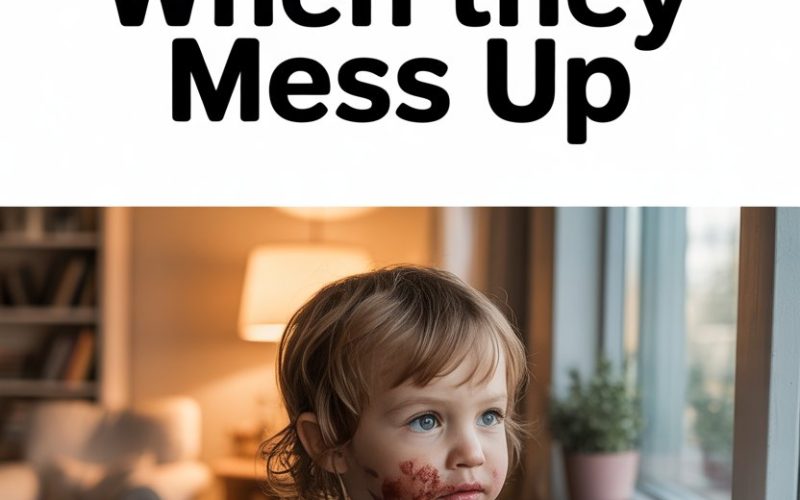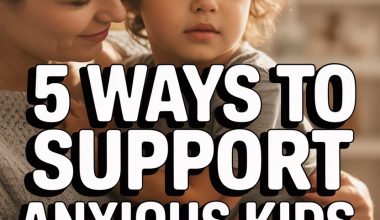Every parent knows the feeling: you hear a crash from the kitchen, or maybe an ominous silence from the playroom—both signs trouble has come knocking.
Maybe it’s a spilled smoothie, a forgotten assignment, or something with permanent marker involved (why do those even exist?).
When kids mess up, hearts race, voices rise, and the logic centre of the parental brain sometimes packs its bags and heads for a beach holiday.
Here’s the good news: those moments—the ones you wish came with a manual—hold some of the best opportunities you’ll ever get to help your child become resilient, confident, and honest.
Turns out, kids don’t need lectures, threats, or a five-page essay titled “Why We Don’t Microwave the Smartphone.” They need something far more valuable: you, at your best, even when they’re at their worst.
Connection Before Correction
Ever notice how kids seem to reserve their grandest disasters for the exact moment you’re most frazzled? There’s a reason for that.
When children mess up, their brains are already in a tumble dryer of emotions—shame, worry, fear. Barking out punishments at that moment is a bit like trying to teach algebra on a rollercoaster.
Research from child development experts like Dr. Daniel Siegel highlights that children need to feel safe and connected before they can process what went wrong or learn from it.
Your child can’t absorb wisdom if they’re busy bracing for the next verbal missile.
Sometimes, the best way to start is simply to sit down beside them and say nothing. A hand on the shoulder, a sigh that says, “Well, that was a pickle,” and a minute to breathe together does wonders for both of you.
Curiosity Over Judgment
It’s easy to jump straight to “Why did you do that?”—often delivered in a tone that says, “And please tell me so I can write it in my diary of parental exasperation.”
What helps more is genuine curiosity. Kids are rarely plotting chaos; they’re experimenting, testing boundaries, or simply having a less-than-stellar day.
Try swapping “Why did you do that?” with “What happened there?” or “Walk me through how we got here.” The difference is subtle but powerful.
You’re inviting your child to share their perspective, not defend themselves in a court of law you’ve just convened in the hallway.
Curiosity can also help you avoid the classic parenting pitfall: assuming intent where there was only accident or immaturity. Even when the dog ends up with a new haircut.
Less Shame, More Accountability
Many adults still carry childhood memories of the day they got caught red-handed: cheeks burning, eyes watering, the heavy cloak of shame descending.
Shame can make kids hide, lie, or act out. Accountability, on the other hand, invites them to own their mistake and make amends.
The trick is to separate the action from the person. Instead of, “You’re so careless,” you might go with, “Leaving your shoes on the stairs means someone could trip. What can we do next time?”
When kids understand that mistakes don’t define them, but their choices for fixing things do, they’re much more likely to fess up the next time.
If you’re after more science on this, the Harvard Center on the Developing Child has a fantastic resource on how positive relationships build resilience, even in the face of mistakes.
Make Repair Possible
You don’t need to swoop in with a dustpan and a credit card every time a disaster strikes. Even young kids are capable of making repairs—wiping up the juice, taping the torn book, offering an apology.
These acts build real-world responsibility, not just an urge to avoid getting caught.
Give your child a role in fixing things.
Sometimes it’s as simple as asking, “What do you think we can do to put this right?” Other times, you’ll need to gently guide them: “We can’t un-bake the iPad, but we can write a note to Dad and save our coins to help replace it.”
Ownership over repairs also helps families avoid the replay of the same scene every Tuesday. Kids who are part of the solution tend to remember the lesson longer than those who only get a scolding.
Empathy Is Not Excusing
Empathy is not handing out “get out of jail free” cards. You can understand why your child did something without condoning it.
In fact, reflecting their feelings—“You were mad and wanted to show your brother how you felt”—often makes it easier for them to accept responsibility.
According to psychologist Dr. Tina Payne Bryson, naming emotions helps kids move past them. “You seem upset that the Lego tower broke, and that made you want to throw something.”
Once the feelings are named, the storm settles. Then, and only then, can you talk about what could be done differently next time.
Let Natural Consequences Teach (When Safe)
Sometimes, the world is the best teacher.
Forgot the lunchbox? That rumbling tummy will do more than ten reminders from you. Stayed up too late? That groggy head in maths class is a solid lesson.
Of course, safety comes first. You wouldn’t let a toddler test gravity from the balcony, but whenever it’s safe, let reality shoulder some of the teaching load. It’s less effort for you, and much more effective for them.
When you’re tempted to rescue your child from every bump, remember: you’re raising an adult, not a houseplant. The stakes are smaller now than when they’re out in the world with their own keys and credit cards.
Modeling Matters More Than You Think
All the “Do as I say, not as I do” in the world won’t make up for a parent who explodes over a stubbed toe or an overcooked dinner.
Kids watch us like it’s their job (which, in fairness, it is). Our reactions in our own moments of “messing up” set the tone.
Missed a work deadline? Forgot a friend’s birthday? Narrate your process out loud: “I’m frustrated that I made a mistake. I’m going to apologise and see how I can fix it.”
Watch how quickly your child adopts this script the next time their own world goes sideways.
If you need inspiration, countless parenting blogs and books, such as Parenting Science, offer real-world examples of parents leading with vulnerability.
Avoid Overreaction and Catastrophe Predictions
There’s a special urge that strikes when your child makes a mistake—visions of future calamity, university rejection letters, and a permanent record kept by the International Federation of Disappointed Parents. Overreaction is natural, but it doesn’t help.
Try this simple trick: ask yourself, “Will this matter next week? Next month? In five years?” Most of the time, the answer is a sheepish “probably not.”
Staying calm doesn’t mean you don’t care. It means you’re willing to keep today’s drama from ballooning into tomorrow’s self-image crisis.
Consistency Builds Trust
If your child expects a different response every time—a shrug on Monday, a lecture on Tuesday, a week’s grounding on Wednesday—they’ll spend more energy managing you than managing their own behaviour.
Aim for predictability. When kids know what’s coming (and that you’ll love them no matter what), they’re less likely to panic or spin a wild tale to get out of trouble.
You may not win any awards for “Coolest Parent of the Year,” but you’ll raise kids who trust you enough to call when they really mess up, later on.
What About Big Mistakes?
Sometimes, the mistake isn’t a toppled cup or a forgotten textbook. Maybe it’s lying, shoplifting, or serious defiance. That’s when your response matters even more.
Big mistakes call for big doses of empathy, honesty, and calm boundaries. You can say, “I love you, and this is a serious problem. We’re going to deal with it together.”
Reach out for help if you need it—family therapists, school counsellors, or community leaders can be invaluable. No shame in having a village on speed dial.
When You Mess Up as a Parent
Spoiler alert: you will mess up, too.
Maybe you yell. Maybe you threaten to cancel birthdays until 2047. Maybe you trip over the exact shoes you’ve nagged about a thousand times and, in the chaos, invent a new word that isn’t exactly in the dictionary.
Apologise. Name it. Make repair. Your child will learn more from your imperfect efforts than a hundred hours of flawless parenting.
Research published by the American Psychological Association shows that children who see adults repair mistakes are more likely to do the same. Now that’s a legacy worth leaving.
The Heart of the Matter
When kids mess up, they don’t need perfection from you—they need presence, patience, and a pinch of humour.
Mistakes are how kids learn. Sometimes, they’re how we learn, too.
Next time you’re cleaning up another “learning experience,” take a breath. Remind yourself: you’re growing a person, not building a robot.
Little by little, through spilled milk and lost library books, you’re teaching your child the most important lesson of all: love is not conditional, and mistakes are just part of the story—never the whole book.





